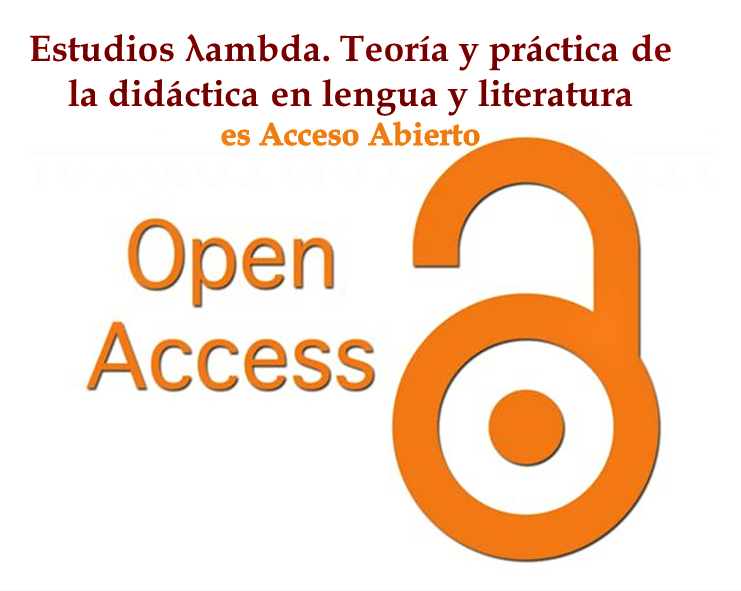λambda Studies. Theory and Practice of Language and Literature Didactics is a digital journal, published continuously every six months, with open access, free of charge and peer-reviewed using a double-blind methodology. The journal is scientific and reflective in nature, with an emphasis on innovation and research related to the teaching of: language and literature, discourse analysis, cultural studies, literacy studies and literary theory. It also includes publications on interdisciplinary research related to the aforementioned topics, as well as the processes of comprehension and production of texts in L1 and L2.
About us
EDITORIAL TEAM
- Dr. Francisco González Gaxiola. Sonora University
- Dra. María de los Ángeles Galindo Ruiz de Chávez. Sonora University
- C. Dra. María Edith Araoz Robles. Sonora University
- Mtra. Ana Bertha de la Vara Estrada. Sonora University
- Dra. Patricia del Carmen Guerrero de la Llata. Sonora University
SCIENTIFIC COMITTEE
- Dr. Tiberio Feliz Murias. National University of Distance Education. Spain.
- Dra. Mailing Rivera Lam. University of Antofagasta. Chile
- Dra. Glòria Bordons de Porrata Doria. University of Barcelona. Spain.
- Dra. Luisa Angélica Puig Llano. National Autonomous University of Mexico
- Dr. Marcelino Jiménez León. University of Barcelona. Spain
- Dra. María Cristina Castro Azuara. Autonomous University of Tlaxcala
- Dra. Claudia Teresa Domínguez Chavira. Autonomous University of Ciudad Juarez
- Dr. Roland Terborg Schmidt. CELE. National Autonomous University of Mexico
- Dr. Martín Sánchez Camargo. University of the Americas
- Dra. Zarina Estrada Fernández. Sonora University
- Dra. Aidee Espinosa Pulido. Autonomous University of Baja California
- Dr. Rosario Fortino Corral Rodríguez. Sonora University
CONTACT
Dr. Francisco González Gaxiola. Sonora University
Humanities and Fine Arts Division.
Department of Letters and Linguistics, 3rd second floor building
Blvd. Luis Encinas y Rosales s/n,
Downtown neighborhood. C.P. 83000
Hermosillo, Sonora, México
Phones (662) 212 55 29 y 2 59 21 87
web page: www.estudioslambda.uson.mx
email estudioslambda@unison.mx
The academic project of λambda Studies. Theory and practice of language and literature didactics is due to the need to have a plural editorial space for academic exchange and discussion in the field of language and literature didactics. It is a journal of a scientific - reflective nature and with an emphasis on innovation and research, which seeks to include the results of educational research in the field of language and literature carried out at a national and international level.
λambda studies. Theory and practice of didactics in language and literature arises from the need to systematize products that over a decade have been reflected, analyzed, problematized and discussed in the International Research Congresses on Didactics of Language and Literature and National Forums on the Teaching of Literature "Josefina de Ávila Cervantes", congress organized by the Department of Letters and Linguistics of the University of Sonora since 1998.
The reason for being of λambda studies. Theory and practice of didactics in language and literature is to become a space for convergence of research with perspectives on communicative processes, both pragmatic and discursive; the reception of the literary text and its aesthetic enjoyment; student-centered pedagogy, as well as their cognitive processes and the contexts in which they develop. Likewise, it seeks to establish itself in the conceptual field of the Didactics of Language and Literature where the visions of the human sciences converge and are unified: linguistics, literature, pedagogy, psychology and sociology.
λambda studies. Theory and practice of didactics in language and literature sees itself as a publication that, due to its quality, becomes one of the main Spanish-language education journals and extends its scope of dissemination, in the first instance, to the scientific communities of Latin America and Spain. Likewise, the journal must be disseminated in the international academic community and appear in the respective indexes, for which a summary in English of each of the articles published is included.
Finally, the magazine must be a space for exchange and debate, which allows discussing and arguing various theoretical and methodological positions on the problems in the field of Didactics of Language and Literature.
λambda studies. Theory and practice of didactics in language and literature has the following objectives:
- To publicize the theoretical and practical research of didactics in language and literature in Spanish-speaking communities.
- Promote the development of theories related to communicative processes, the reception of the literary text, cognitive processes and curricular approaches around language and literature.
- Give an account of methodologies and techniques that are used in research and innovation in didactics of language and literature.
- Promote knowledge of the national and international reality on the processes of reading and writing through the dissemination of original research.
- Disseminate international articles that mark perspectives for research and innovation in didactics in language literature that have not been published in Latin America.
- Strengthen the quality of research in the pedagogy of language and literature, the cognitive processes involved, the reception and aesthetic enjoyment of literature and the processes of reading and writing, as well as the relationship with the national academic community and international.
- Encourage the participation of teams and researchers in the consolidation process.
- Promote the discussion on problems presented by current communication processes, the intervention of technologies in reading and writing, processes in language and second language teaching, the possibilities of innovation for the promotion of aesthetic enjoyment and literary creation.


